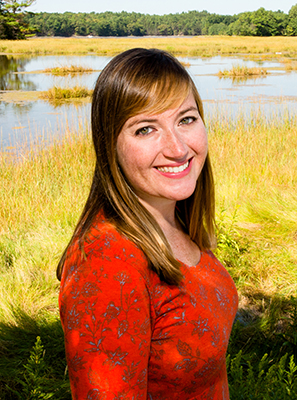Quixada Moore-Vissing
Research Interests:
Public engagement
Resources:
Mitchell Center Talk, September 17, 2018
Ditching the Divide: Rejecting Abrasive Political Culture & Cultivating Healthy Local Democracy
Degrees:
PhD in Education, University of New Hampshire, Durham, NH. 2017
Master of Arts in Communication, University of Illinois, Urbana-Champaign, IL. 2011
Master of Arts in Teaching, University of New Hampshire, Durham, NH. 2002
Bachelor of Arts, Literature and the Avant-Garde, Boston University, magna cum laude, Boston, MA. 2002.
Profile:
Quixada Moore-Vissing has published several works about public engagement and democracy, most recently including a chapter in a higher education book about dialogue and engagement on college campuses as well as a white paper with Public Agenda about how social trends and technological innovations may impact the future of democracy. She also regularly delivers talks about public engagement, including for the MacArthur Foundation, the Maine Development Foundation, Saint Paul’s School, and the Mitchell Center in their lecture series. She has taught and collaborated with both graduate and undergraduate students at land grant and private universities across the country. Further, as director and founder of her own public engagement consulting business, she works with a range of national partners including Everyday Democracy, Public Agenda, the Deliberative Democracy Consortium, the Ben Franklin Circles, and New Hampshire Listens. Quixada has been collaborating with a range of statewide partners including Mitchell Center researchers to develop a Maine Network of Engaged Communities with the intention to connect and strengthen public engagement across our state. She brings to the Mitchell Center research, teaching, and leadership skills related to public engagement.
Selected Publications:
Mallory, B.L, Holt-Shannon, M., and Moore-Vissing, Q. (Forthcoming, spring 2019). “Fulfilling the land-grant mission while strengthening democratic practice.” Discussing democracy: A primer on dialogue and deliberation in higher education. (Ed. Shaffer, T. and Longo, N.) Stylus.
Leighninger, M, and Moore-Vissing, Q. (Forthcoming, spring 2019). Rewiring democracy: Subconscious technologies, conscious engagement, and the future of politics. Public Agenda.
Grim, Jeffery, Moore-Vissing, Q., and Zimdars-Mountford, A. (Forthcoming, spring 2019). A comparative study of the factors shaping postsecondary aspirations for low-income students in Greater Boston and Greater London. The British Journal of Sociology in Education.
Mallory, B, Moore-Vissing, Q, and Holt-Shannon, M. (2018). Community based deliberative democracy: The case of New Hampshire Listens. New England Board of Higher Education. https://nebhe.org/journal/community-based-deliberative-democracy-the-case-of-new-hampshire-listens/
Vissing, Y, Burris, S, and Moore-Vissing, Quixada (2016). The technology bias: What Google teaches us about child rights. Societies without Borders 11(1).
Vissing, Y, and Moore-Vissing, Quixada (2016). Rights education: An exploratory analysis of what students know about their rights. Education and Society 34 (1), pp.61-74.
Mallory, Bruce and Moore-Vissing, Quixada. (2013). New Hampshire’s 2012 Civic Health Index. The Carsey Institute. Report can be viewed at http://scholars.unh.edu/carsey/193/
Moore-Vissing, Quixada (2013). “Teaching Civil Disobedience in U.S. History through Gandhi, King, and Thoreau”. The Living Gandhi: Lessons for Our Times. Tara Sethia & Anjana Narayan (eds.). New Delhi, India: Penguin Books.
Moore-Vissing, Quixada and Yvonne Vissing (2010). “Dialogue Circles and Groups”. Encyclopedia of Peace. Oxford University Press.
Vissing, Yvonne and Quixada Moore-Vissing. (2010). “Peace Training: Assessing Success in Peacemaking”. Encyclopedia of Peace. Oxford University Press.
Vissing, Yvonne and Quixada Moore-Vissing. (2010). “Eminent Person Mediation”. Encyclopedia of Peace. Oxford University Press.
Moore-Vissing, Quixada and Yvonne Vissing. (2010). “Women’s Rights”. Encyclopedia of Peace. Oxford University Press.

